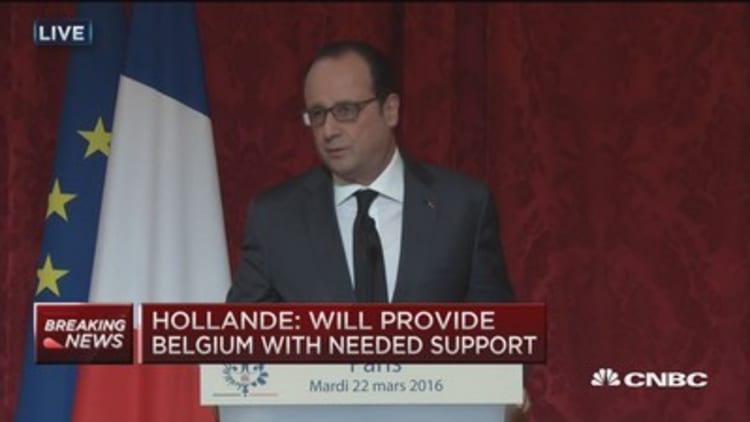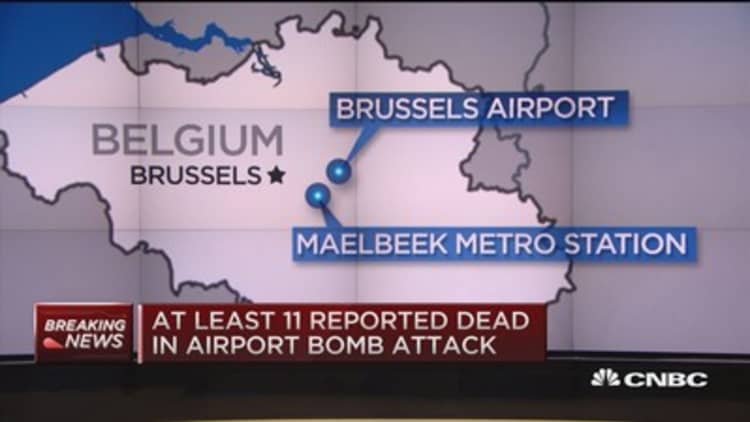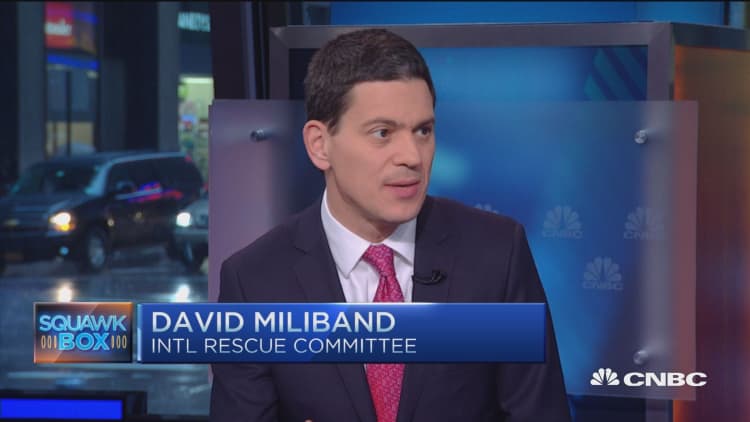
French President François Hollande said on Tuesday that the attack on Brussels was an attack on all of Europe. When it comes to the economy, he may be more right than he knows.
After attacks in Belgium's capital claimed the lives of at least 31 people, the country reintroduced border checks. That move, and the attacks themselves, raise further questions about the future of an open borders policy that is critical to the movement of people and commerce in most of the European Union.
The region's Schengen Agreement, originally signed in 1985, allows travelers to cross borders of participating countries without immigration controls or passport checks. Currently it includes 22 EU countries, plus four European Free Trade Association member states.
"Today's attacks are certainly not good news for Schengen. When countries first started instituting border controls across Europe in September, it was a question of managing the flow of migrants," Ian Bremmer, Eurasia Group president, told CNBC in an email Tuesday. "With Paris, suspending Schengen became a question of national security. Brussels fits into this latter category."
The Brussels attacks struck as Europe is still recovering from terrorist attacks that killed 130 people in Paris last fall. Security experts and some European citizens are likely to call for tighter border controls that can make it harder for terrorists to move from country to country.
"I think that like many other agreements, the Europeans will try to keep Schengen in place. But countries will be more willing to ignore the rules and introduce border controls if they feel they have to do it," Adriano Bosoni, senior Europe analyst at geopolitical research firm Stratfor told CNBC on Tuesday.
"Once you are in Europe, the first place you land in Europe, you're wherever you want to go in Europe," retired U.S. Army Col. Jack Jacobs told "Squawk Box" on Tuesday. "It's been astonishing for decades, how the Europeans could be as complacent as they have been about security when the borders are completely and totally open."
Why open borders matter
But open borders are fundamentally important to the European economy. Many companies based in the region have structured their operations across borders, with factories and offices in multiple countries. Those firms would face an immediate increase in transportation and labor costs simply to move goods between their assembly plants.
Bremmer pointed out that 1.7 million people cross European borders every day to get to work.
The chief executive of automaker Opel, Karl-Thomas Neumann, told Reuters earlier this month that his company regularly ships parts between Germany, Spain, Poland, Britain and Italy, which with the exception of the UK are all members of the Schengen Area.
"We have huge logistics operations in southern Europe; any disruption would have an immediate impact on the bottom line," Neumann told the news service.
A study conducted by German research institute Bertelsmann Stiftung forecast last month that increased border controls would cost Germany, Europe's biggest economy, about 77 billion euros ($86.3 billion) between now and 2025. The researchers noted that Germany would be hit particularly hard if the Schengen agreement were dissolved, because it is surrounded entirely by Schengen states.



The current agreement allows participating countries to temporarily reintroduce border controls by submitting a request to the European Commission. However the commission's website describes that move as a "step of last resort and would be used only if all other measures...were ineffective in mitigating a serious threat."
Eurasia Group's Bremmer told "Squawk Box" Tuesday morning that a possible model for Europe's borders can be seen between Israel and Palestine.
"If you can't keep the refugees out, then you have to ensure that you keep security measures strong," he said, adding that such a system would likely lead to increased surveillance and "differentiated rules for those that are deemed to be potential threats."
"There's going to be a lot of social instability that comes with that. It will tear at the fabric of what we think Europe is. It'll certainly hurt the economies," Bremmer said.
"But nonetheless, if you're going to double down on security — and we see this happening in France after the November bombings...I think [Israel-Palestine is] the sort of model we should increasingly be looking at," Bremmer said.
Stratfor analyst Bosoni explained that while the European Commission has the legal tools to punish countries that reinstate border controls without permission, it's unlikely that such a move would bring any real consequences. In order to bring down the hammer on countries violating Schengen rules, the commission would be required to reach a consensus, and any country breaking the rules would only need a few allies to dodge judgement.
Ultimately, national safety concerns will force Europeans to reconsider existing regional agreements.
"These attacks do little to ease Europe's multiple political, economic and social issues," Bosoni explained. "The EU tried to overcome the national states, but in times of crisis, deep crisis, when a country sees its own integrity is at stake, they will turn back to national politics."
Check out CNBC's full coverage of the Brussels attacks.
— Reuters and CNBC's Tom DiChristopher contributed to this report.




